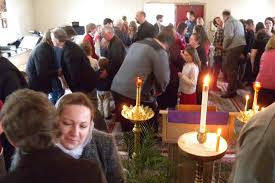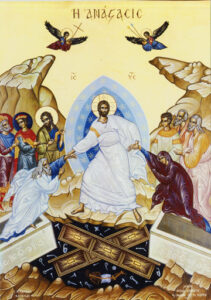If you think this Post reads suspiciously like the text for a homily or sermon… you are a very perceptive person.
For reasons I won’t go into, I have suddenly become “un-retired” and am serving as interim priest at my old parish, Saint Nicholas, Cedarburg, Wisconsin. “But, Lord, I was already over-busy in retirement!” It is really true what you’ve heard: that we become busier in retirement than we were before. Or is it that we’re just older and have less energy? No matter, I have been especially pressed for time this week (which explains why I’m posting it a day late) and therefore this article will also serve as this Sunday’s homily at Saint Nicholas. (If you really love this Post, come to Saint Nicholas and hear it in person!… assuming you don’t object to eight inches of fresh snow on the ground.)
Now, to the subject.
Note. These are not my instructions, these are…
The Church’s Last Minute Instructions as we go into Lent

The Church Fathers chose our Sunday Scripture Readings at this time of year very carefully
Epistle: Romans 13:11-14:4
I can still hear my mother long ago calling up the stairs “Bill, wake up! It’s time for school. Are you out of bed yet?” One morning I answered sleepily, “Almost…” My mother was not impressed.
Over seventy years have passed since my mom called me. But God is still calling: Wake up. Get moving. Nor is God impressed if we say “almost” to Him. Time is passing. Paul says “the day of our salvation is nearer than when we first believed”. That is the truth.
Lent is our annual wakeup call. Life is short. We don’t have forever. Are you awake and moving forward towards goodness and holiness and the Kingdom of God ? If I say to God “Almost”, He’ll be no more impressed than my mom was.
Take another image: A Matins hymn begins “The Lenten spring has come”. “Now tell me another one…”, say we in Wisconsin. But we know it’s coming. Already we have a few bulbs up back of the house. The days are getting longer, and the sun brighter. By the time we get to Pascha, spring will have come and the darkness of winter will be over. Our life on earth is Lent, but we are moving on towards the Kingdom of Heaven, the eternal Spring which Christ’s resurrection brought in, “the light of Christ which knows no evening.”
However, there’s a catch here: As Saint Paul says, “the light of Christ” will finally expose all the darkness of this world, and all the darkness in our lives. Therefore he advises: Get rid of all the dark things in your life now: “revelry, drunkenness, lewdness, lust, fighting, envy” and more – because if we hang onto the darkness, then when the light of Christ appears, we are going to be very embarrassed. Actually more than embarrassed. A lot more.

The purpose of Lent is to get the darkness and sin out of our lives while we have time, to seek God and goodness, so that when Pascha comes we will be better and holier people than we were on Clean Monday.
Listen carefully: Fasting from food without fasting from sin misses the point entirely. In fact, it’s dangerous. As one pre-Lenten hymn says, “If we fast from food but not from sin, we become just like the evil demons who never eat at all.”
Holy Gospel Matthew 6:14-21
1 ”If you forgive men their trespasses your heavenly Father will also forgive you, but if you do not forgive men their trespasses neither will your Father forgive your trespasses”. Jesus said this immediately after He had taught His apostles the Lord’s Prayer with that horrible line – I trust you listen to yourself when you pray it – “Forgive us our trespasses as we forgive those who trespass against us.” Father, if I hold a grudge against anyone, please hold a grudge against me. If I turn anyone away from anyone in anger, please turn away from me in anger.
I’ve told the story often before about the monk who had led a not very exemplary life, but on his deathbed he was cheerful as could be. The other monks asked him: considering the life you led, how can you be so happy? He answered Because I have forgiven everyone who ever hurt me, so I know God will have to forgive me.
But you say, “It wasn’t my fault. It was his fault / her fault.” Maybe it was. Maybe it wasn’t. Who cares whose fault it was? We’re supposed to forgive anyway. The real question is: How do we get past it and move on with life? That’s what today is all about.
What does it mean to forgive? I think it’s two-fold.
First, it means we don’t pay the other person back. We don’t try to get even. Sometimes in Confession people say to me: “I thought I had forgiven [someone] but I’m not sure I have. I’m still angry. I still feel like getting even. In response I have been known to ask, “Have you hired a hit man to wipe him out?” * And when they say “No”, I answer, “Then you’ve begun to forgive. Now, just keep doing it.” You get the point.
- I know that’s silly. I believe counseling during Confessions should not be as solemn as some priests make it. I think this often helps people loosen up.
C S Lewis wrote that when the Lord told Peter to forgive his brother 70 times 7 times, that applies to each sin. We’ve got to forgive it again and again and again and again and again and again and again… till the desire to get even goes away.
Second, to forgive someone means to put down the hurt the other person has caused you, the pain within you that hardens your heart. You know what I’m talking about: that hurt that you just can’t seem to get rid of. Every time you finish thinking about something else, here it comes again: The pain eats away at you, interferes with your worshiping, your praying, your thinking, even your sleep. Getting rid of this is even more difficult to do. But if you don’t, it makes your heart become hard.

Please, for the sake of your immortal soul, you must try to get rid of that hard heart. Don’t carry that burden through Lent, through life. It will weigh you down, you won’t be able to move ahead, and at the end of life, at the End of all things, if you haven’t rid yourself of it, it may have pulled you so far down that you’ll wind up somewhere you do not want to go. Try to carry a hard unforgiving heart into Heaven and you’ll be told: Go to… somewhere else. You’ve already made your hell on earth.
Therefore, the Holy Orthodox Church in her wisdom has brilliantly given us an easy way to forgive as we enter into Lent. It’s called Forgiveness Sunday. All over the Orthodox world today, people will be apologizing, saying “Forgive me, a sinner”, and forgiving: “God forgives, and I forgive”. I’ve read that in the old days in some old world countries, people would walk down the street saying to total strangers “Forgive me a sinner”, “forgive me a sinner.” (Don’t try that here! They’ll have people come and take you away!)
If there is anyone you truly need to apologize to, this is the day to do it: Say it, phone it, write it, email it, text it, Viber it: ”Forgive me, a sinner”. On Forgiveness Sunday afternoon I email it to everyone I know whom I missed at church: I have no idea who I may have inadvertently offended. If the person has departed, say “forgive me, a sinner” in prayer, and let the angels deliver it. There were people I hurt long ago; two of them died before I apologized. Every day in prayer I ask their forgiveness. Whatever you need to do, do it: Say “forgive me”.
Now… do not forgive people ostentatiously: Out the clear blue you walk up to someone you’ve been at odds with and say “I forgive you”. No! That would do more harm than good. However, today is the day to take the first step. Do or say something nice for the person.
What if the person who hurt you is not sorry? what if he could care less? Then don’t waste your e-mail on him. But you must forgive anyway: in your heart you must let it go. He has hurt you enough. Why should you let him continue to have power over you? continue to make your miserable? So for your own sake, you must forgive, lay it down, be rid of it.
One more point: Use your good judgment about how to go about all this apologizing and forgiving. For example, if you’re fairly certain the other person is still angry… You’ve likely had the experience of trying to make up with somebody too soon, before emotions had settled down, and it just led to another blowup. So be cautious. But always be ready to apologize, ready to forgive.
Forgiveness Vespers. On this Sunday, the Church offers us a service which has long been used in the Slavic tradition, and is now becoming common in our Antiochian and Greek tradition.
Forgiveness Vespers is our transition into Lent. In the middle of it, the priest changes into violet Lenten vestments, and the hymns go Lenten. Forgiveness Vespers really should be held in the evening. However, at Saint Nicholas, Cedarburg, as scattered as our people are, it’s hard for most of them to come back, so we have it at about Noon, before people can get away.

Forgiveness Vespers is a beautiful service, and not long; it can be held to a little over a half hour if the chanters behave themselves. At the end all come forward and, beginning with the priest, we say to each other, each of us to each of us: “Forgive me a sinner”, “Forgive me a sinner”. The classic response, if you want to use it, is “God forgives and I forgive”. But don’t worry about the details. It’s enough just to say “Forgive me a sinner”. Properly, I guess, we should bow to each other. At Saint Nicholas we just give each other a hug.

While exchanging forgiveness, in the background you’ll hear (what? already?) the Paschal canon: “It is the day of resurrection… shine, shine, O Jerusalem, the glory of the Lord has risen upon you.” That is where Lent will take us: into the Resurrection. That is where our life in Christ should be taking us, through the shadows of sin and despair and confusion, into growing light of the true Spring, as we follow our Lord Jesus into the Resurrection.
2 “When you fast do not be like the hypocrites [play actors] with sad faces who do it so they appear to be fasting. They have their reward. When you fast anoint your head, wash your face so you do not appear to be fasting, but to your Father in secret, and your Father who sees in secret will reward you openly.” Jesus says if your purpose in fasting (or praying or giving or anything) is so people will notice, then that’s your reward. “No cream in my coffee! it’s Lent.” “ I can’t eat that! I’m fasting.” No! Look: if someone serves you meat during Lent, just eat it gratefully, then go back to the Fast. When you fast (note Jesus says when, not if) put a smile on your face. and say “please pass the vegetables. Mmm, good”, and God who sees what is secret will reward you.
3 Finally and most important “Do not lay up for yourselves treasures on earth where moth and rust destroy and thieves break in and steal. Lay up for yourselves treasures in heaven where neither moth nor rust destroy and thieves do not break in and steal, for where your treasure is, there will your heart be also.”
Lent is the time to get our priorities straight again. Of course we need food and shelter and money. Of course, work and support yourself and try to be self sufficient and not be a burden on others. Paul wrote regarding slackers: “Let him who does not work not eat.” But if that is the center of your life, if your bank account and your food and your car and your big TV and your house are your real treasure – then, good luck. You know you can lose them overnight – because of thieves or the stock market. Lose your job and your health insurance and have a medical emergency, and you can lose it all in a minute.
And surely you know that before long you’re going to leave all these things behind. Is this really a secret? “You can’t take it with you.”
However, actually “you can take it with you”. What can I take with me into eternity? Three things and three only: My love for God, my love for people, and me. That is why the chief commandments for, lo, these 3000 years have been: Love God with all your heart and soul and mind and strength and love your neighbor as yourself. You’d think we’d all catch on, it’s so obvious… but theres’s not much sign of it.
Therefore during Lent, reprioritize. Go for the gold. Build up true security, treasure that will last.
Some of you work twenty five hours a day, I know, but during Lent, if you can, try to cut back a bit on something -. entertainments and distractions, TV, computer, whatever – don’t give up your children! – and find some way to focus on God.
Worship regularly. If you aren’t able to make Sunday Liturgy, come to Saturday Vespers or another Lenten service.
Pray morning and evening – according to your situation. Those of us who are retired (or were!) should have time for an extensive prayer life – meditation, Scripture reading, intercessions. On the opposite extreme, if it’s a mother with a “paying job” (either away from home or at home) and little kids to look after, I think it’s often sufficient for her to occasionally cry “Help, Lord”. Others should work it out for themselves.
Read the Scriptures either by book or online. The easiest way: the Greek Archdiocese will email the daily readings to you! Go to https://www.goarch.org/chapel at the very bottom of the page.
Concentrate on people: especially your family and others whom you love.
Give to the needy.
Love God and love people, and you will without effort find the third thing: you – your true self. And you will find yourself on the road into God’s eternal Kingdom.
And that is what Lent is all about.
Next Week: Advice about Fasting from Saint John Chrysostom and Saint Isaac the Syrian and others.
Week after Next: The Forty Holy Martyrs